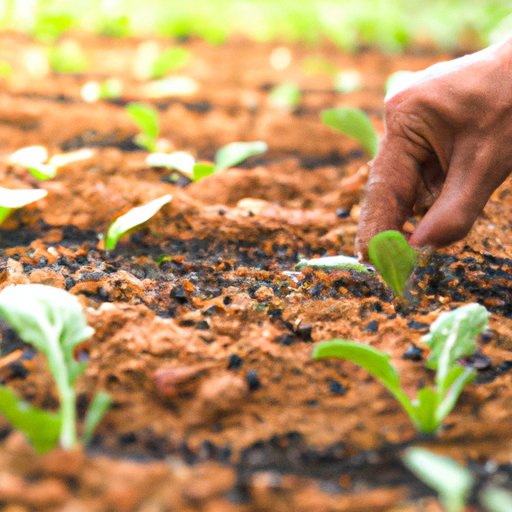Introduction
Agricultural science is a broad field that combines elements of biology, chemistry, economics, and other disciplines to understand and improve the production of crops and livestock. From ancient practices to modern technologies, it has been instrumental in helping humanity feed itself. This article will take an in-depth look at what agricultural science is and how it is transforming farming practices, addressing food security, and impacting global climate change.
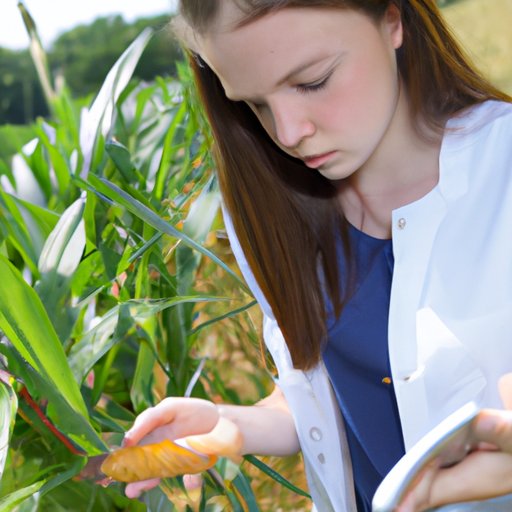
Exploring the Basics of Agricultural Science
At its core, agricultural science is the study of how to increase crop and livestock production in order to meet global demands for food. It involves understanding the environmental conditions that influence crop growth, such as soil quality, temperature, and moisture levels; the genetics of plants and animals; and the economic factors that affect farming operations. As a result, agricultural scientists must have knowledge in multiple disciplines in order to succeed.
What is the Role of Agricultural Science?
The main goal of agricultural science is to develop new techniques and technologies that can increase crop yields and make farming more efficient. This includes developing genetically modified crops that are resistant to pests or drought, using advanced irrigation systems to conserve water, and developing new fertilizers and pesticides. Additionally, agricultural scientists work to reduce the environmental impacts of farming, such as soil erosion, air and water pollution, and biodiversity loss.
How Does it Differ from Other Sciences?
Agricultural science is unique in that it is both a practical and a theoretical science. On one hand, agricultural scientists must use their knowledge to develop solutions that can be implemented in the real world. On the other hand, they must also conduct research in order to gain a better understanding of how the natural world works and how it can be manipulated to increase crop yields. According to Dr. Robert Brown, a professor of plant and soil sciences at Iowa State University, “Agricultural science deals with the entire life cycle of a crop or animal, from planting the seed or embryo to harvesting and marketing the final product.”
How Agricultural Science is Transforming Modern Farming Practices
Advances in agricultural science have allowed farmers to dramatically increase crop yields and reduce labor costs. For example, precision agriculture uses GPS technology and sensors to monitor soil quality and determine when and where to apply fertilizer and water. This has enabled farmers to reduce the amount of resources they need to grow crops, resulting in higher yields and lower costs. Additionally, genetic engineering has allowed scientists to create crops that are resistant to disease, pests, and extreme weather conditions. This has made farming more reliable and profitable.

The Use of Technology in Farming
Technology has become an essential part of modern agriculture. In addition to precision agriculture, farmers are now using drones to monitor their fields, robots to harvest crops, and artificial intelligence to predict weather and market trends. These technologies are helping to make farming more efficient and cost-effective, while also reducing the risk of crop failure. According to Dr. David Johnson, director of the National Institute of Food and Agriculture, “Modern technology is allowing us to do things we never thought possible before. We are now able to produce more food with less land, water, and energy than ever before.”
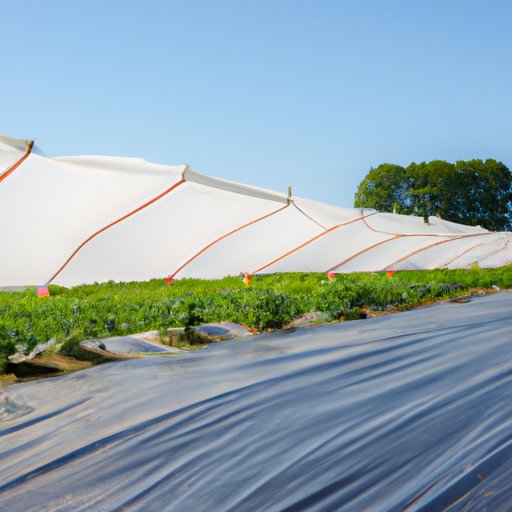
New Strategies for Sustainable Agriculture
Sustainable agriculture is an important part of agricultural science. It refers to farming practices that are designed to protect the environment and conserve natural resources. This includes using organic fertilizers and pest control methods, rotating crops to prevent soil depletion, and preserving natural habitats. By adopting sustainable farming practices, farmers can reduce their environmental footprint and ensure that their farms remain productive for generations to come.
The Role of Agricultural Science in Food Security
Agricultural science plays a vital role in ensuring global food security. It helps farmers to increase crop yields so that more people can be fed. Additionally, it helps to reduce food waste by developing new storage and packaging techniques that prevent spoilage. Finally, agricultural science is helping to improve nutrition by introducing new varieties of crops and livestock that are rich in essential vitamins and minerals.
Its Impact on Malnutrition
Malnutrition is a major problem in many parts of the world, and agricultural science is playing a key role in helping to address this issue. Through the development of new varieties of crops and livestock, agricultural scientists are helping to provide more nutritious food options to those who need it most. Additionally, advances in agricultural technology are making it easier for farmers to access markets and sell their products, thus increasing their incomes and improving their ability to purchase nutritious foods.
Increasing Access to Nutritious Foods
In addition to developing new varieties of crops and livestock, agricultural science is also helping to reduce hunger and malnutrition by increasing access to nutritious foods. This includes providing smallholder farmers with the tools and training they need to increase their yields, as well as creating new distribution networks that allow farmers to get their products to local and international markets. According to the World Bank, “Agricultural science is playing an increasingly important role in helping to reduce poverty and hunger around the world.”
Uncovering the History of Agricultural Science
Agricultural science has a long and fascinating history. Ancient civilizations developed sophisticated techniques for growing crops and raising livestock, which were passed down through generations. As human societies became more complex, so too did the science of agriculture. During the 19th century, scientific advances such as nitrogen fixation and hybridization revolutionized farming and helped to increase crop yields. Today, agricultural science continues to evolve as scientists strive to develop new ways to feed an ever-growing population.
Ancient Practices and Knowledge
It is estimated that humans first began practicing agriculture about 12,000 years ago. Early farmers used simple tools to till the soil, plant seeds, and harvest crops. They also developed techniques to raise livestock and manage their pastures. Over time, these early farmers developed a deep understanding of the natural world and how to best utilize it for food production. This knowledge was passed down through generations and eventually led to the development of modern agricultural science.
Development of Modern Agricultural Techniques
In the 19th century, agricultural science underwent a dramatic transformation. Scientists began to develop new theories and technologies that could be used to increase crop yields and improve livestock health. This included innovations such as synthetic fertilizers, hybridization, and mechanization. By the 20th century, the science of agriculture had become a highly specialized field, with scientists focusing on specific aspects of crop and livestock production.
Examining the Impact of Agricultural Science on Global Climate Change
Agriculture is one of the leading contributors to global climate change, accounting for about 25% of all greenhouse gas emissions. This is due to the burning of fossil fuels for energy, the use of chemical fertilizers, and the release of methane from livestock. As a result, agricultural scientists are working to find ways to reduce these emissions and mitigate their impacts.
The Relationship between Carbon Emissions and Farming
One of the primary sources of carbon emissions in agriculture is the burning of fossil fuels. This includes fuel used to power farm machinery, as well as the transportation of crops and livestock. Additionally, the use of chemical fertilizers releases nitrous oxide, a powerful greenhouse gas. To reduce these emissions, agricultural scientists are developing new techniques to increase crop yields without relying on fossil fuels or chemical fertilizers.
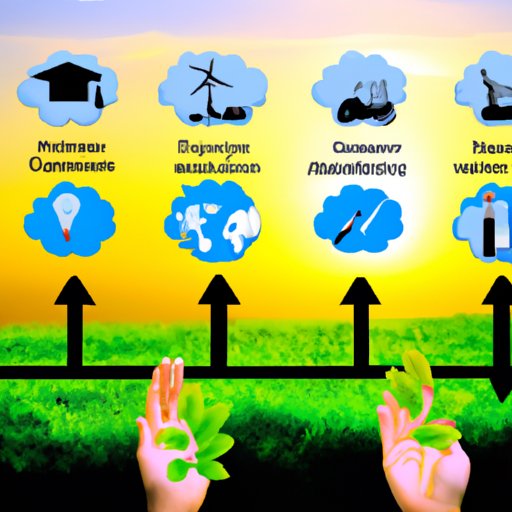
Potential Solutions to Minimize Climate Change
Agricultural scientists are exploring a variety of strategies to minimize the impacts of climate change. These include developing more efficient farming practices, such as precision agriculture and conservation tillage; encouraging the use of renewable energy sources; and promoting the adoption of sustainable farming methods, such as organic agriculture. Additionally, scientists are researching new technologies, such as genetically modified crops, that may help to reduce emissions and increase crop yields.
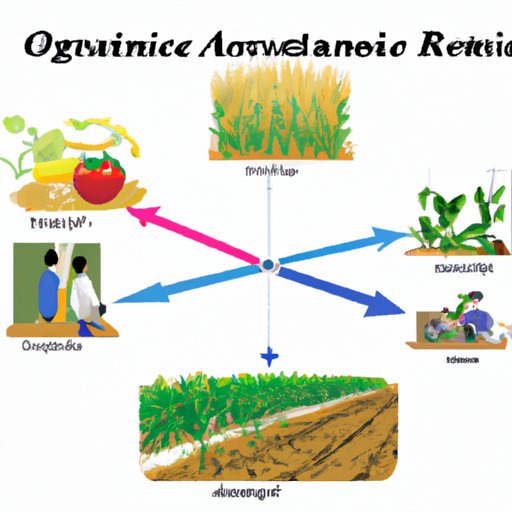
Understanding the Relationship between Agricultural Science and Organic Agriculture
Organic agriculture is a type of farming that does not use synthetic fertilizers or pesticides. Instead, it relies on natural methods, such as crop rotation and the use of beneficial insects, to control pests and maintain soil fertility. Organic farming is becoming increasingly popular among consumers, and agricultural scientists are studying ways to make it more efficient and productive.
Advantages of Organic Farming
Organic farming has several advantages over conventional farming. For example, it reduces the risk of groundwater contamination, since synthetic fertilizers are not used. Additionally, organic farms tend to have higher levels of biodiversity, which helps to maintain the health of soils and ecosystems. Finally, organic farmers often receive higher prices for their products due to increased consumer demand.
Challenges Faced by Organic Farmers
Organic farmers face several challenges, including finding markets for their products and dealing with pests and diseases. Additionally, organic farming requires more labor and resources than conventional farming, making it more expensive and time-consuming. To overcome these challenges, agricultural scientists are developing new organic farming techniques, such as integrated pest management and cover cropping, that can reduce costs and increase yields.
Conclusion
Agricultural science is a complex and ever-evolving field that is essential to global food security and sustainability. Through the development of new technologies and techniques, agricultural scientists are helping to increase crop yields, reduce environmental impacts, and improve nutrition. Additionally, they are exploring ways to reduce the impacts of climate change and promote organic agriculture. As the global population continues to grow, agricultural science will become increasingly important in meeting the world’s food needs.
(Note: Is this article not meeting your expectations? Do you have knowledge or insights to share? Unlock new opportunities and expand your reach by joining our authors team. Click Registration to join us and share your expertise with our readers.)
